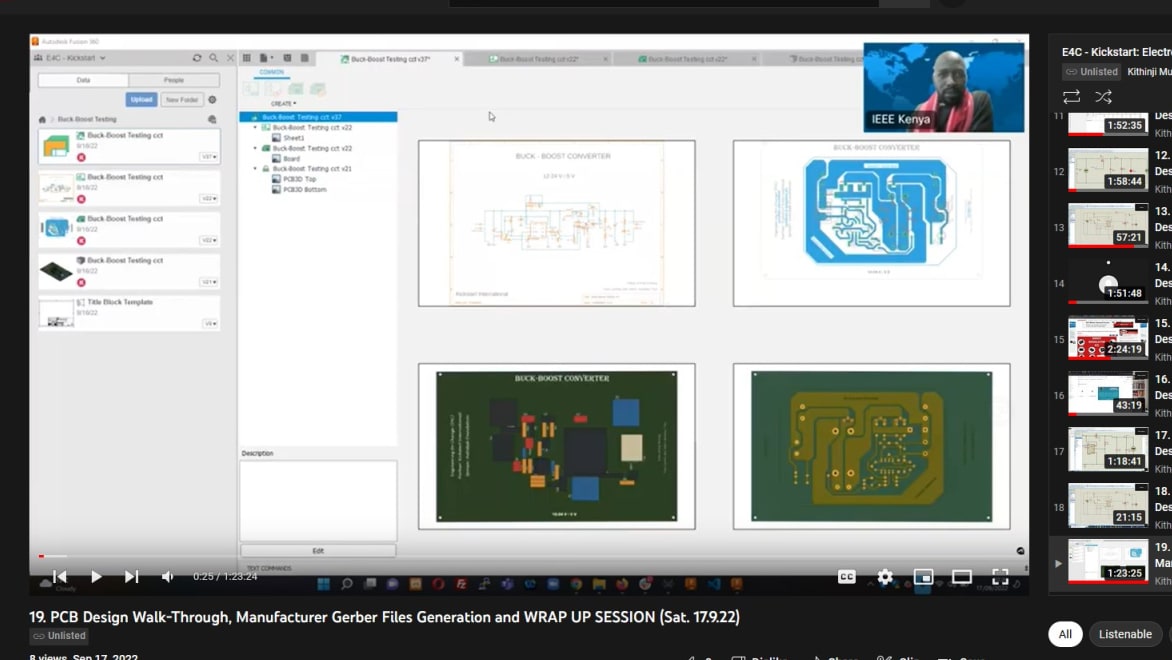KICKSTART
KickStart develops new electronics training program for solar pump design with Fusion 360
SUSTAINABILITY
Share this story
Summary
With support from the Autodesk Foundation, KickStart develops and mass produces high-quality irrigation tools for farmers in Africa. Its farmer-centric “MoneyMaker” branded irrigation pumps have helped bring 1.4 million people out of poverty. In 2022, Kithinji Muriungi joined KickStart as an Engineering for Change (E4C) Fellow to develop an end-to-end electronics design and training process workflow for a new solar pump design.

Image courtesy of KickStart
New solar pump design provides opportunities—and challenges
According to KickStart, more than 80% of those living in poverty in Africa are smallholder farmers—and they all rely on the same weather and growing season. Prices plunge when a deluge of crops hits the market at the same time, propelling a cycle of persisting poverty. KickStart helps subsistence farmers to “make their own rain” by designing and promoting climate-smart irrigation technologies to lift them out of poverty and produce crops year-round.
KickStart, an alum of the Autodesk Foundation’s Health & Resilience portfolio, is working on the debut of a smart, IoT-based solar-powered pump. Solar pumps provide a few different advantages, including reliability, low cost, and the ability for use across all seasons to increase crop yields. KickStart needed a way to upskill its design team with new electronics knowledge.
Training program to scale growth
In 2022, Kithinji Muriungi began working with KickStart as an electronics engineer and Engineering for Change Fellow. The E4C Fellowships, supported by Autodesk Foundation and other organizations in partnership with Engineering for Change, empower early-career engineers and other technical professionals worldwide to work on local and global sustainable development challenges while building professional skills and relationships. The Autodesk Foundation supports E4C Fellows who commit five months of work with nonprofits and startups such as KickStart.
At KickStart, Muriungi focused on advancing design workflows and developing a successful use case for a training program focused on solar pump electronics design. This training would help improve KickStart’s capacity to add more qualified mechanical engineers on staff.
“The training program will be used to replicate and scale end-to-end electronics design and training process workflow for both the new team joining KickStart and the existing members who want to get a holistic perspective regarding electronics design,” Muriungi says. “It will also be used as a template while developing customized electronics training programs internally. It requires a full understanding of electronic circuit design through virtual, physical, and hands-on practical sessions.”
During his time on the project at KickStart, Muriungi recorded 20 virtual training session videos, developed a training work plan, and created educational presentation slides and decks.

One of Kithinji Muriungi's virtual training sessions in action. Image courtesy of Kithinji Muriungi.
Training Fusion 360 and electronics design
KickStart is using Fusion 360 for the solar pump design. The ability to collaborate remotely and have real-time access to a single platform for both electronics and mechanics is especially helpful for the KickStart team.
“Fusion 360 provides one reliable design tool for both mechanical and electronics designs to manage design workflows,” Muriungi says. “It’s a secure tool for collaborative team design and demonstrates the significance of remote design work and cloud-based collaboration. It absolutely provides the trainees with ease of use, flexibility, and speed to learn the software.”
Moving forward with lessons learned
Upon completion of his E4C Fellowship and work with KickStart, Muriungi was selected as an Expert Fellow with Engineering for Change with a focus on electronics, power systems, renewable energy, embedded systems, electricity markets, and battery sources in developing regions such as Africa, Latin America, and Southeast Asia.
He is also pursuing an engineering PhD program at Purdue University. His research interests are on how to educate engineers to be more innovative, entrepreneurial, and real-world problem-solvers while building future-proof and sustainable startups, especially in the under-resourced regions with a special focus in Sub-Saharan Africa.
“I’m excited to continue my education and career path with a focus on engineering and education that will make an impact in developing regions,” Muriungi says.
Get Fusion 360 for the classroom
Autodesk offers free educational access to Fusion 360 software, learning content, and other resources.